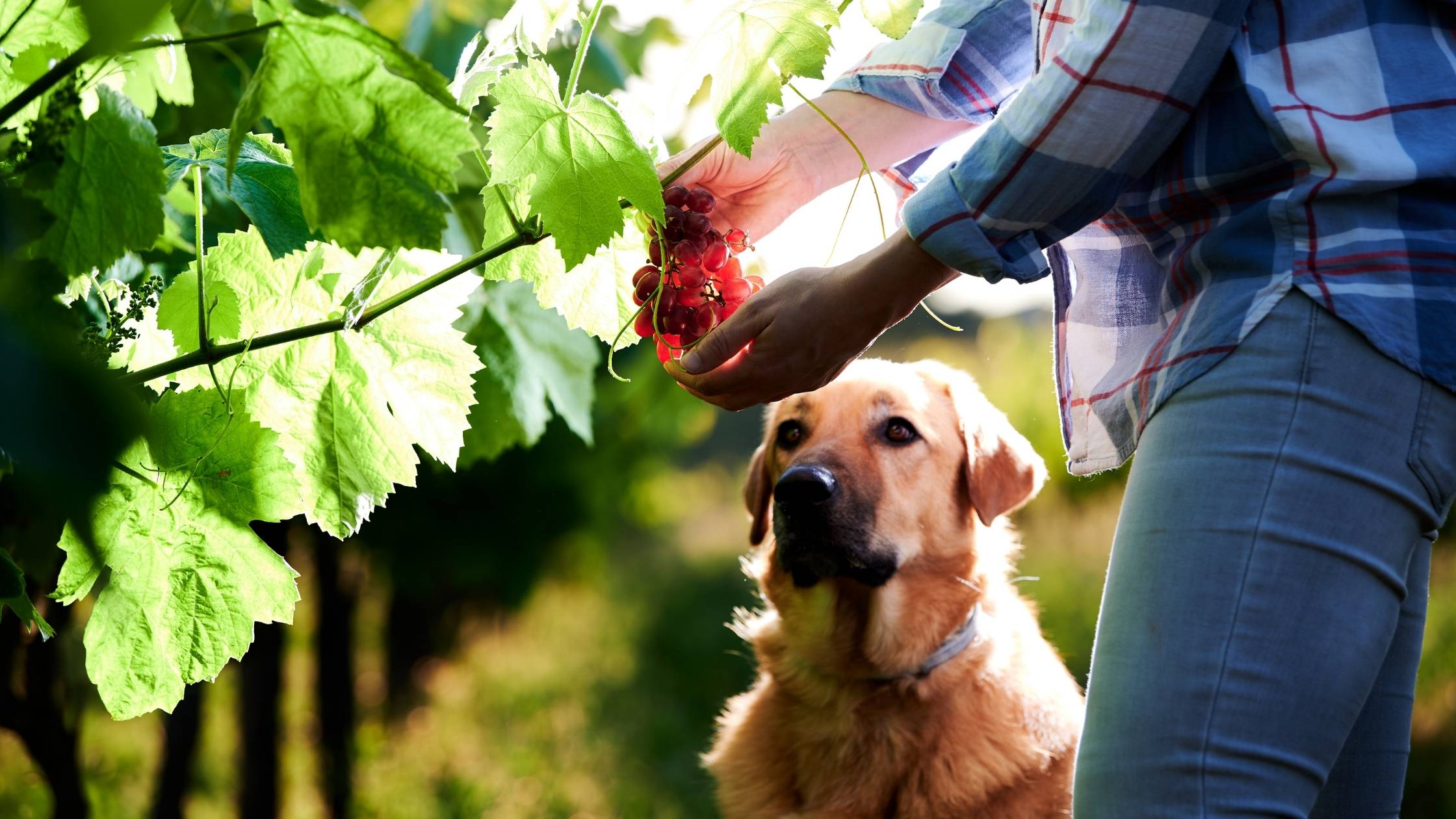Dogs can have many types of human food, especially certain fruit and veg. Some fruits and vegetables can be really healthy for them. However, that does not mean all types of fruit and veg are safe for dogs to eat. Pet owners need to be careful of what human foods they give to dogs.
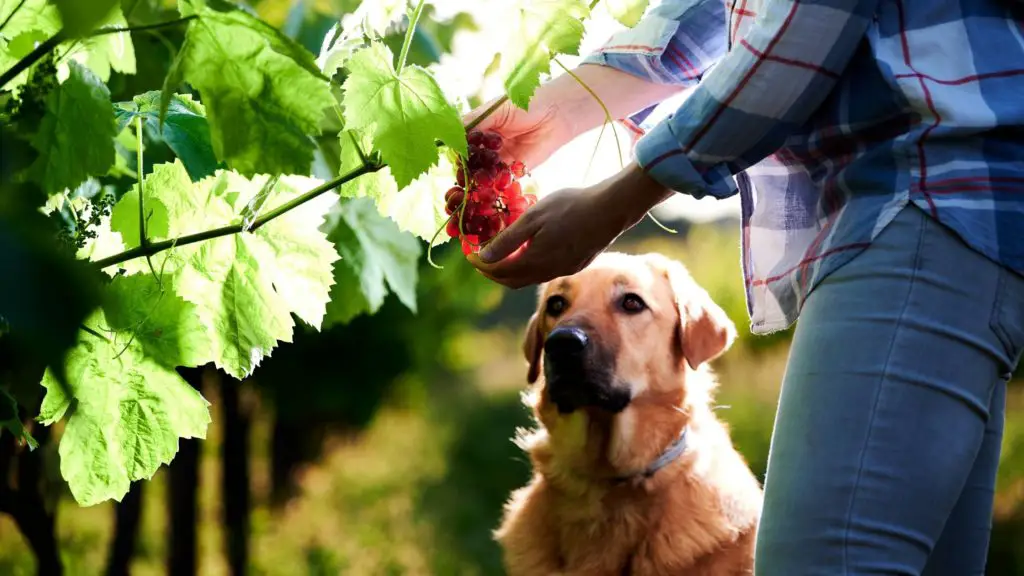
So, what about grapes? Are they healthy for dogs? Are they dangerous? What are the important considerations for dog owners? Let’s find out…
Can Dogs Eat Grapes?
No, dogs cannot eat grapes. All kinds of grapes are bad for dogs, even seedless grapes. Researchers are not sure what toxin is in grapes, but it can lead to many issues like kidney failure. Therefore, dogs should not eat grapes to avoid grape toxicity.

Grapes and other grape products like grape juice and raisins are bad for dogs. Even a few ounces of grapes can poison a dog. So, it would be best for pet owners to find safe fruits to give their dogs instead of grapes.
Why Are Grapes Bad for Dogs?
People do not know why grapes are bad for dogs. That is because they do not know what toxin is in grapes that harm dogs. So far, scientists say that the poisoning is not from heavy-metal, pesticide or fungal causes. Poisoning in dogs was observed in all kinds of grapes, including seedless ones. Therefore, it is not because of the grape seeds, but the toxins come from the grape flesh and skin.
The Side Effects of Grapes for Dogs
Dogs react badly to the toxins found in grapes. The exact toxin that causes dogs to be poisoned is unknown. However, there are common side effects that dogs experience when they eat grapes. Grape toxicity in dogs often leads to decreased appetite, vomiting, diarrhea, weakness, tender abdomen, little or excessive urination, dehydration, increased thirst, etc.
The toxins in grapes can quickly attack a dog’s body. A dog would likely suffer the side effects mentioned above, and it can quickly get worse. A dog can get severely dehydrated from vomiting, diarrhea, etc. It can take a toll on the dog’s body. In severe cases, grape toxicity can lead to kidney failure. However, that usually only happens if grape toxicity does not get treated.
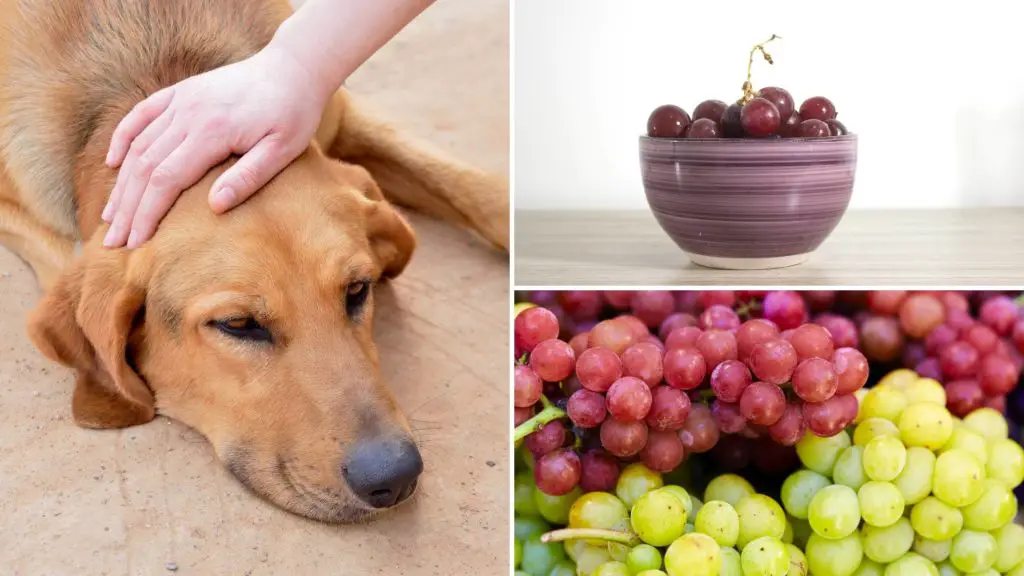
Prolonged untreated grape toxicity can often lead to kidney failure. As the toxins stay in the body, they will affect the dog’s kidneys. The kidneys could shut down and stop urine output, which is dangerous. In very severe cases, the blood pressure can drop and can suddenly increase and put the dog in a coma. Pet owners can prevent potential kidney failure in dogs by bringing their dogs to the vet to prevent and treat the symptoms of grape toxicity.
It is difficult to say what will happen to a dog if they develop kidney failure from eating raisins. Kidney failure can be very harsh on dogs, no matter how healthy they were before they ate the raisins. Typically, a dog has a 50% chance of survival once they get kidney failure. However, the survival rate goes down the longer the dog has the toxins in its body. Therefore, it is best to seek medical help for dogs before they develop kidney failure to prevent intense complications.
What Kind of Grapes Are Bad for Dogs?
Pretty much every kind of grape is bad for dogs. It does not matter if they are seedless, peeled, etc. All kinds of grapes can cause adverse reactions in dogs. Seedless grapes are toxic to dogs, so it is not because of the grape seeds. Moreover, all colors of grapes can poison dogs. Therefore, it would be best for dogs to avoid any kind of grapes.
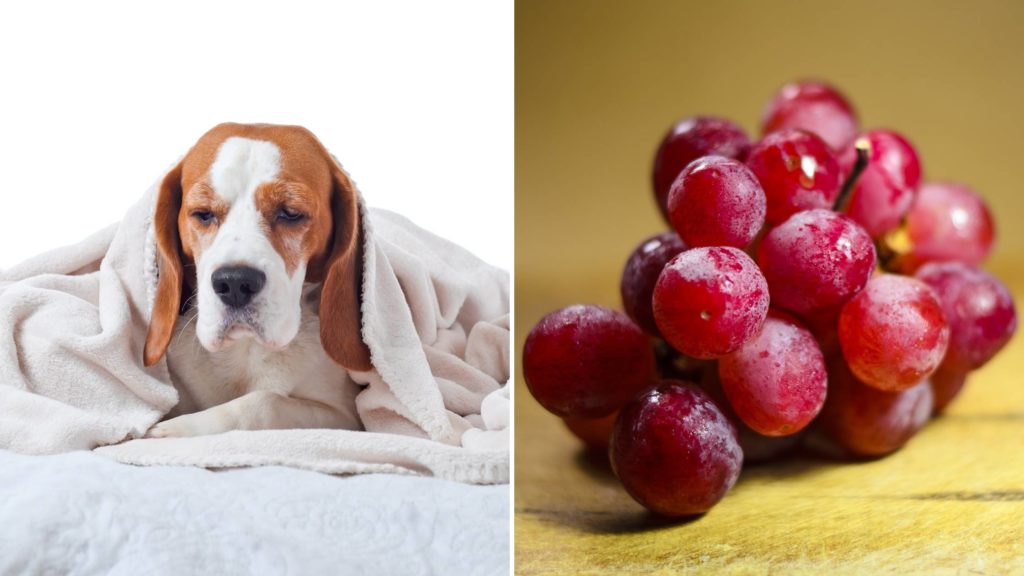
Can Dogs Eat Raisins?
No, dogs cannot eat raisins. Raisins are still grapes, so they are still toxic. In fact, raisins can be more dangerous because they are concentrated grapes. Grapes get dried to become raisins, so even a few raisins can poison a dog. Therefore, a dog should not have raisins to avoid potential poisoning.
Are Currants Bad for Dogs?
True currants, which are usually white, red and black, are usually not bad for dogs. However, dogs can experience upset stomachs when they eat currants. Moreover, “fake currants” like Zante currants are raisins, and they are easy to mistake for currants. Therefore, it would be best for dogs to avoid currants altogether.
Is Grape Juice and Grape Seed Extract Bad for Dogs?
Grape juice is often made from a high concentration of grapes. Like raisins, grape juice could be worse for dogs because it contains more grapes in a small amount. Moreover, store-bought often has other additives like sugar, flavor enhancers, etc. These additives are not good for dogs and can further worsen the effects of grapes on a dog.
Grape seed extract seems to be safe for dogs, but it is still best not to give it to them. The grape seeds do not poison dogs, so the toxin is likely in the grape flesh itself. Some people use grape seed extract for their inflammatory conditions in dogs like arthritis because the seeds do not seem to be toxic. However, there is not enough evidence to prove that the extract is 100% safe.
Are Foods with Raisins, Grapes, and Currants Bad for Dogs?
Yes, foods that contain grapes and other grape products are bad for dogs. Even a muffin with a few raisins in it can be bad for dogs. These foods are still potential sources of poison for dogs. Therefore, they should avoid foods that contain grapes and other kinds of grapes altogether.
How Many Grapes Is Too Many for Dogs?
The exact number of grapes it would take to harm a dog is unknown, but it is best never to give it to them to stay safe. The lowest known amount of grapes that can cause kidney failure in a dog is 0.3 ounces per pound of the dog’s body weight. Therefore, it would only take 2-3 ounces to poison a dog that weighs 50 pounds.
Even a few grapes can greatly harm dogs. It depends on how sensitive their bodies are. Even 1-3 grapes can make a healthy dog sick. For instance, 2-3 grapes can make a medium-sized dog vomit, feel lethargic, etc. There are some cases where dogs eat a lot of grapes and nothing happens to them. However, that does not mean they can have grapes again. Additionally, pet owners ought to observe their dogs to see if any side effects occur.
How Long Does It Take for Grapes to Poison Dogs?
It mostly depends on the dog’s current condition, size, how many grapes they ate, etc. For instance, a small dog with health issues that ate a lot of grapes would likely show symptoms a few hours after eating grapes. A big and healthy dog that eats 1-2 grapes may start showing mild symptoms 24 hours after eating grapes.
The milder symptoms of grape toxicity (lethargy, decreased appetite, etc.) often occur 12-24 hours after eating grapes. Vomiting, the most common sign, often occurs within about 24 hours after a dog eats grapes. Typically, the more serious signs tend to show up 24-48 hours after grape ingestion. However, that often means acute kidney failure started, so it would be best to bring a dog to a vet the second they exhibit mild symptoms.
Is It an Emergency if a Dog Eats Grapes?
It mostly depends on how the dog reacts to grapes. It is always best to bring a dog to a vet to be sure. However, a grape may not always cause side effects in dogs. For instance, a big dog breed that steals one grape may not exhibit any symptoms of grape toxicity for 1-2 days. Therefore, they may not need to see a vet. However, if a dog exhibits any symptoms of grape toxicity (vomiting, pain, etc.), it would be best to bring the dog to a vet immediately to treat the symptoms and prevent it from getting worse.
Is There an Antidote for Grape Poisoning?
No, there is no antidote available for grape poisoning in dogs. As mentioned earlier, people do not know what toxins in grapes can poison dogs. So, there is no antidote that can specifically target the toxin affecting dogs. Therefore, vets can only give various treatments to remove the toxins and treat the symptoms of grape toxicity.
How Does Grape Toxicity Get Diagnosed?
The symptoms of grape toxicity are fairly unspecific, so there is no sure-fire way to diagnose it. The symptoms are often similar to other conditions, like kidney failure. Therefore, a vet will usually conclude that it is grape poisoning if a pet owner says that their dog ate recently or has a history of eating grapes. Grapes and other grape products may also appear in the dog’s vomit.

Vets often conduct tests on dogs. The tests do not usually confirm if it is grape poisoning, but the tests are crucial to assess the dog’s status. For instance, a vet would normally perform tests to get the dog’s complete blood count. They may also perform tests like a urinalysis (to see if there is kidney damage), serum biochemistry profile, etc. These tests can help a vet estimate the dog’s chances of recovery.
What to Do If a Dog Eats Grapes
Firstly, a pet owner should watch out for any symptoms of grape toxicity in dogs. A dog that eats one grape may not exhibit any symptoms, so it may not need much help. They may only require some water and rest. If a dog shows 0 symptoms 48-72 hours after eating a few grapes, they may be fine.
However, dogs that show symptoms of grape poisoning would need to go to a vet immediately. It would be best to bring them to a vet as soon as they show signs. The longer the symptoms of grape toxicity last, the higher the chance the dog can have kidney failure. Grape toxicity is also a painful and unpleasant experience for dogs, so a vet can treat the symptoms before they worsen.
The primary goal of treatment is to minimize kidney damage and block toxin absorption. Vets typically begin procedures on the dogs that remove toxins from the body. A dog would get different treatment because dogs have different conditions, allergies, etc. It will also depend on the severity of the poisoning. Vets may also perform other procedures on the dog to treat the symptoms of grape toxicity. For instance, they may hook a dog up to an IV to hydrate a severely dehydrated dog.
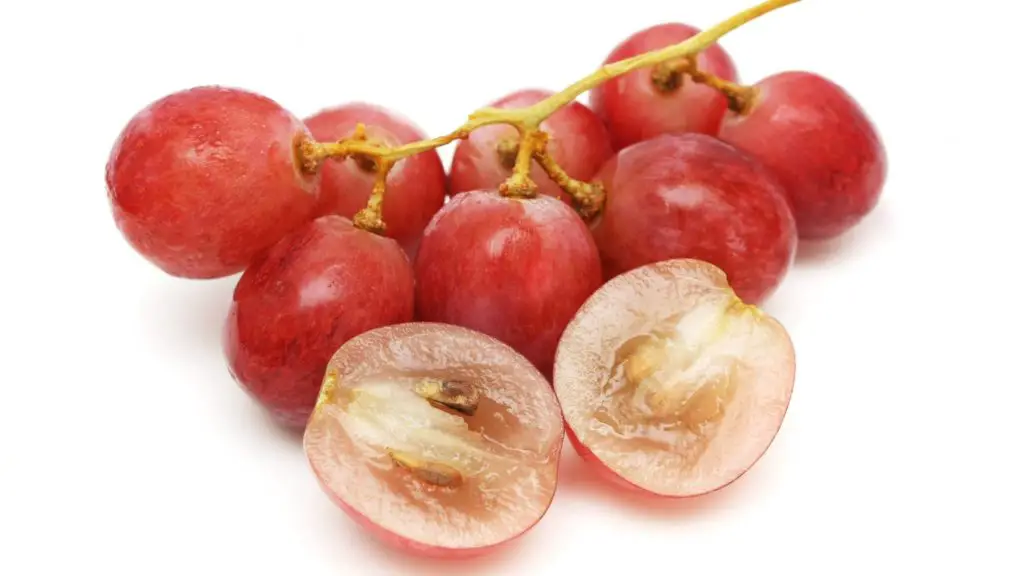
Most vets will start decontaminating dogs by trying to remove the toxin. Typically, vets will use activated charcoal and encourage the dog to vomit. Activated charcoal is powerful because it absorbs toxins in the dog’s intestines and stomach so it can stop poisoning the dog. Inducing vomiting is also crucial because raisins and grapes can stay in the stomach for a long time. Grapes and raisins can stay in a stomach for 4-6 hours, so vomiting can help a dog remove the source of the problem.
Once a vet decontaminates the dogs, they usually try to remove more toxins. Vets often use aggressive IV fluids so they can flush out toxins in the dog’s body. The dog would have likely absorbed some toxins already, so the IV fluids can remove the already absorbed poison to prevent kidney failure. Moreover, the vet will likely give the dog medication to control vomiting, nausea, control blood flow, maintain blood flow to the dog’s kidneys, etc.
It is also important to observe the dog and consider some factors. Generally, it is always best to bring the dog to the vet to keep them healthy. However, one grape would greatly harm a Yorkie Poo’s health, but it would likely not impact a Great Dane’s health as badly.
To Conclude
Overall, all forms of grapes are dangerous for dogs. A small number of grapes can poison dogs, even if they are generally healthy. Therefore, dogs should never have grapes.
References:
- ASPCA, ‘People Foods to Avoid Feeding Your Pets’, https://www.aspca.org/pet-care/animal-poison-control/people-foods-avoid-feeding-your-pets, Accessed – 06 May 2021
- VA Hospitals, ‘Grape, Raisin, and Currant Poisoning in Dogs’, https://vcahospitals.com/know-your-pet/grape-raisin-and-currant-poisoning-in-dogs, Accessed – 06 May 2021
- Bishop Ranch Veterinary Centre & Urgent Care, ‘Grape and Raisin Toxicity by Frank Utchen, DVM’, https://www.webvets.com/Resources/resource.php?Grape-and-Raisin-Toxicity-by-Frank-Utchen-DVM-64, Accessed – 06 May 2021

